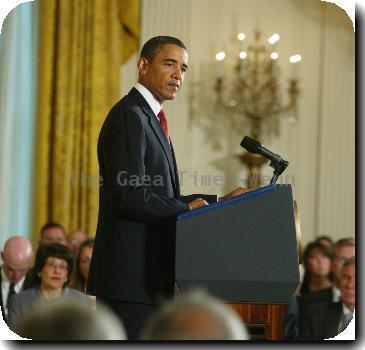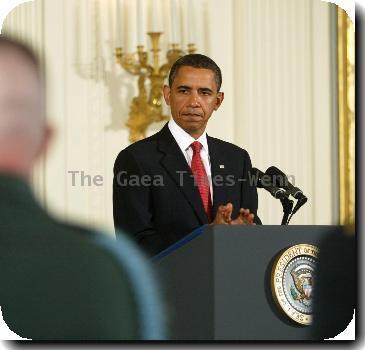Unemployment rate tops 10 percent for first time since 1983; 190,000 jobs lost in October
By APFriday, November 6, 2009
Jobless rate tops 10 pct. for first time since ‘83
WASHINGTON — The unemployment rate has hit double digits for the first time since 1983 — and is likely to go higher. The 10.2 percent jobless rate for October shows how weak the economy remains even though it is growing. The rising jobless rate could threaten the recovery if it saps consumers’ confidence and makes them more cautious about spending as the holiday season approaches.
The October unemployment rate — reflecting nearly 16 million jobless people — jumped from 9.8 percent in September, the Labor Department said Friday. The job losses occurred across most industries, from manufacturing and construction to retail and financial.
Economists say the unemployment rate could surpass 10.5 percent next year because employers are reluctant to hire.
President Barack Obama called the new jobs report another illustration of why much more work is needed to spur business creation and consumer spending. Noting legislation he’s signing to provide additional unemployment benefits for laid-off workers, Obama said, “I will not rest until all Americans who want work can find work.”
The government’s monthly unemployment report is based on two surveys, one of households, one of companies’ payrolls. The household survey showed that about 558,000 more people were unemployed last month than in September, raising the total to 15.7 million. The company survey, however, showed only a third as many job losses — 190,000.
The disparity can be explained by the fact that the company survey doesn’t count people who are self-employed and undercounts employees of small businesses. That’s why some analysts, like Diane Swonk, chief economist at Mesirow Financial, say last month’s household survey could be an ominous sign for the economy.
One struggling small business, Miller and Smith Inc., a home builder in McLean, Va., has trimmed its work force to about 97 from 350 at the height of the housing market in 2005. The company has been hurt by a slowdown in building and surging health care costs.
Miller and Smith faced a 44 percent increase in the cost of health insurance over the past year that it managed to reduce to 23 percent.
“You can have … one person get in a traffic accident on the weekend, and it completely blows your claim experience out of the water,” Human Resources Director Selina Burke said.
Troubles for small businesses could have a disproportionate effect on the economy, because they account for about 60 percent of the nation’s jobs. They tend to rely on credit cards and home equity lines to maintain their cash flow. Banks have tightened credit in many of these areas.
The 10.2 percent unemployment rate does not include people without jobs who have stopped looking for work or those who have settled for part-time jobs. If you counted those people, the unemployment rate would be 17.5 percent, the highest on records dating from 1994.
“It’s not a good report,” said Dan Greenhaus, chief economic strategist for New York-based investment firm Miller Tabak & Co. “What we’re seeing is a validation of the idea that a jobless recovery is perfectly on track.”
That’s hurting people like Jose Betancourt, 57, who goes to a Miami-area career center twice a week to take computer education classes. Betancourt has been out of work since July, when he was laid off from his supermarket maintenance job. He lives on about $600 a month in unemployment benefits, barely enough for the rent for his efficiency apartment, food and utilities.
Betancourt has trouble believing the recession is over. In his neighborhood, he sees other jobless people and empty stores.
“It’s as if they just gave the economy a nice coat of varnish to make everyone feel better,” he said. “I’m in a state of anxiety, and I see it all around Miami.”
Last week, the government said the economy grew at a 3.5 percent annual rate in the July-September quarter, the strongest signal yet that the worst recession since the Great Depression is over. But that growth isn’t fast enough to turn the job market around.
“You need explosive growth to take the unemployment rate down,” Greenhaus said in an interview Thursday.
The economy soared by nearly 8 percent in 1983 after a steep recession, lowering the jobless rate by 2.5 percentage points that year. But the economy is unlikely to improve that fast this time, as consumers remain cautious and tight credit hinders businesses. In fact, many analysts expect economic growth to moderate early next year, as the impact of government stimulus programs to boost home and car buying fades.
Despite the rise in joblessness, the stock markets were little changed Friday afternoon. The bleak jobs report reassured investors that the Federal Reserve won’t raise record-low interest rates any time soon. The prospect of continued low rates tends to lead investors to shift money into stocks.
High unemployment is likely to become a political liability for Obama and Democrats in Congress. Most economists expect the jobless rate will remain above 9 percent through next November, when congressional elections are held. When unemployment topped 10 percent in the fall of 1982, President Ronald Reagan’s Republican Party lost 26 seats in the House.
Republicans and Democrats on Capitol Hill traded blame over the unemployment figures.
Rep. Barney Frank, the Massachusetts Democrat who chairs the House Financial Services Committee, said the economy would have been much worse had congressional Democrats not approved Obama’s $787 billion stimulus package in February.
Republicans countered that Obama’s focus on increased spending was making things worse.
“More debt, more spending … clearly has not worked — particularly in a time of double-digit unemployment,” said Senate GOP Leader Mitch McConnell of Kentucky.
One sign of how hard it still is to find a job: The number of Americans who have been out of work for six months or longer rose from 5.4 million to 5.6 million, a record. They account for 35.6 percent of the unemployed population, matching a record set last month.
Congress sought to address the impact of long-term unemployment this week by approving legislation extending jobless benefits for the fourth time since the recession began. The bill would add 14 to 20 extra weeks of aid and is intended to prevent almost 2 million recipients from running out of unemployment insurance during the upcoming holiday season.
October was the 22nd straight month the U.S. economy has shed jobs, the longest on records dating back 70 years.
The report showed job losses remain widespread across many industries. Manufacturers eliminated a net total of 61,000 jobs. Construction shed 62,000 jobs. The economy has lost a net total of 7.3 million jobs since the recession began in December 2007.
The average work week was unchanged at 33 hours, a disappointment because employers are expected to add more hours for current workers before they begin hiring new ones.
There were some bright spots in the report.
Education and health care added 45,000 jobs. Professional and business services companies added 18,000 jobs. The beleaguered auto industry added 4,600 jobs, its first gain since July. And temporary employment grew by 33,700 jobs, its third straight month of gains after steep losses earlier this year. That’s a positive sign because employers are likely to add temporary workers before hiring permanent ones.
While the unemployment rate hasn’t yet topped the post-World War II high of 10.8 percent set in December 1982, many experts say this recession is worse.
“This may be the toughest employment situation we’ve seen in the postwar era,” Mark Gertler, an economics professor at New York University, said.
Associated Press Writers Jim Kuhnhenn and Anne Flaherty in Washington, and AP Business Writers Emily Fredrix in Milwaukee, Christopher Leonard in St. Louis, Adrian Sainz in Miami, Andrew Vanacore in New York and Tom Murphy in Indianapolis contributed to this report.
Tags: Barack Obama, Business And Professional Services, Careers, Florida, Jobs report, Labor Economy, Losing A Job, Miami, Milwaukee, New York, North America, Personal Finance, Personal Loans, Personnel, Real Estate, Recessions And Depressions, Unemployment, Unemployment rate, United States, Us-economy, Washington, Wisconsin






















